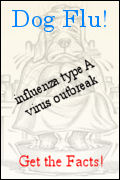|
|

The CSPCA Charitable Trust needs your support through donations to continue vital research projects. Your donation is tax deductible.

RASP (Rescue A Shar-Pei) is a volunteer group with a concern for abandoned and abused Shar-Pei in Illinois / Indiana / Wisconsin and surrounding areas. |
 
|
 |
|

Health Issues
 Genetic Tests Genetic Tests
Fueled by the explosive advancements in biology, genetics, biochemistry, molecular
biology and technology we have entered a time of significant advances in the study
of genetic diseases in dogs. The completion of the Canine Genome Project will only
accelerate our understanding in this area. Key to the practical usage of knowledge
in the field of canine genetic diseases is the development and application of DNA-based
genetic tests. DNA-based genetic tests identify differences in DNA sequences and are
of two different types. The mutation-based test recognizes disease-causing mutations
while the linked polymorphism test recognizes DNA differences that are near the
disease-causing gene and are used to track both normal and mutant alleles of that
gene through pedigrees. An allele is an alternative form of a gene inherited from
each parent. There are differences in how these two tests are developed and used but
both involve the same basic techniques. The most powerful tool developed in the last
10 years or so is the polymerase chain reaction (PCR). By the use of this tool millions
of copies of the same DNA sequence can be produced resulting in amplification and the
ability to allow rapid genotyping of marker alleles from minute amounts of genomic DNA.
A rough analogy would be to take a swab of an infected ear and grow the organism on an
agar plate so the organism can be identified and other tests could be done on the larger sample.
- Mutation-based tests recognize the specific DNA mutation that causes
the genetic disease. These tests:
- require knowledge of the specific mutation (which requires that the normal gene
sequence is known).
- can be used for carrier detection as well as detection of affected animals.
- may be breed specific, so different tests may be necessary to test for the same disease in
different breeds.
- do not require DNA samples from additional members of a pedigree.
- Linked polymorphism tests recognize variations in DNA sequence outside but closely linked to the gene involved in the disease. This type of test:
- requires the identification of a specific polymorphism or variation in DNA sequence near
a disease-causing gene and that is linked with that gene. This means that the they are
inherited together. DNA from many individuals within pedigrees in which the
disease appears is necessary. However it is not necessary to know the exact mutation, or
even the disease-causing gene.
- is most accurate for use in families in which the parents of the animal in question are
heterozygous (have two different alleles) at the linked marker focus and DNA is
available from an affected full sibling of the animal to be tested.
- will be in error a small proportion of the time. An error occurs when there is
recombination between the linked polymorphic locus and the disease-causing gene. The
closer the two genes are, the less chance for recombination to occur and the smaller the
degree of error.
Genetic tests in general should:
- Help us to detect healthy dogs, carriers and affected dogs.
- Allow us to detect healthy dogs that do not carry mutant alleles
- Allow us to prevent mutant alleles from being passed on to the next generation.
How useful and how successful a genetic screening program depends on the following
requisites:
- The disease causes enough of a problem to warrant selective breeding.
- The test for heterozygotes (carriers) is accurate and affordable.
- Culling of heterozygotes doesn’t deplete key genetic resources.
- Test and control program should be acceptable to breeders
- Genetic counseling is available to breeders.
- Parent club have rules to insure control is based on test results.
The role of veterinary medicine in genetic screening programs includes:
- providing accurate diagnosis of genetic disease.
- providing laboratory testing for carriers.
- providing genetic counseling.
- promoting ethical practices.
- research.
The role of the breed club includes:
- developing and maintaining open registries to provide results of genetic tests to the
- breed fancy and to the research and scientific community.
- cooperation in genetic test development by providing samples, pedigree
- information and funding for research.
- cooperation in developing genetic disease control programs.
Below is a listing of currently available genetic tests and informative web sites:
Currently Available Genetic Tests
View List (updated)
|
|

